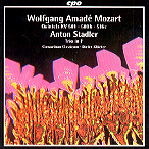Harsh, edgy sound strips this remastered 1974 recording of desirable warmth and seriously impairs its rating on the ear-friendliness scale. It’s not unlistenable by any means–a couple of adjustments to your sound system’s treble and volume controls (turn both down) will greatly improve the quality–but there are other newer, much better recordings of Mozart’s deservedly popular Clarinet Quintet K. 581 to choose from, including the excellent David Shifrin/Emerson Quartet version on DG. Given the fact that this piece contains some of the most recognizable and beloved Mozartean themes and reigns as one of the great masterpieces of chamber music repertoire (its sublime second movement alone explicitly demonstrates this composer’s supreme affective power and melodic gifts), it belongs in every serious CD collection. And although it’s very well played here (clarinetist Dieter Klöcker makes a lovely tone and renders the Larghetto as beautifully as anyone), the sonic deficiencies require that you look elsewhere for a reference version.
If you already own a recording of K. 581, you may be interested in this disc for the rest of its program, which includes two quintet fragments that the disc’s producers suggest may have been “preliminary studies for the great Clarinet Quintet.” One is for the same set of instruments–clarinet and string quartet; the other is for clarinet, basset-horn, and string trio. While typically rich in ideas and full of promise, these are unfinished works and as such are primarily interesting for historical reasons. The other pieces are a violin/viola duo that Mozart wrote in 1783 as a favor to Michael Haydn to help him complete a commission after he fell ill. It’s a wonderful and rarely heard three-movement work that not surprisingly exploits both instruments’ registers and timbres, bouncing one off the other, then joining them in characterful expressions of varying moods, concluding with a substantial theme-and-variations movement.
Finally, we hear clarinetist/composer Anton Stadler’s Trio for three basset-horns. This is a curiously beautiful, charming work that in just 12 minutes says all it has to say. The four movements give lots of variety in style, tempo, and mood, which is important when you’re listening to three identical-sounding, reedy wind instruments. It’s not great music (Stadler’s friendship with Mozart and virtuosity on the clarinet didn’t translate into exceptional composing skills), but it’s engaging entertainment. Again, the performances by Klöcker and members of Consortium Classicum are fine–and if you’re curious about this unusual program, you shouldn’t let the inferior sound scare you away. (Incidentally, if you’re interested in hearing more Stadler–and Mozart–basset-horn music, check out an excellent, recently-released ASV recording that contains divertimentos and trios; type Q4601 in Search Reviews.)
































